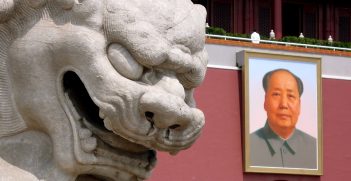China, The International Criminal Court, And Global Governance

China’s relationship with the International Criminal Court stands in contrast to its dealings with other international institutions. Reasons for this include a history of colonialism and the need to protect its sovereignty.
Introduction
The International Criminal Court (ICC), which was established by the Rome Statute in 2002, is a significant development in global governance on human rights. It is the world’s first permanent international criminal court set up to promote the rule of law, ensure the protection of human rights and punish the gravest international crimes. Although China has accepted that the creation of such an institution was a positive addition to the legal architecture of global governance, it has thus far refused to join the ICC.
China and the ICC
The interest of China in the ICC, however, was not terminated by its refusal to join in 1998. Ever since then, it has maintained a dialogue with the ICC and remained involved in its subsequent developments. China kept a prominent position in the work of the Preparatory Commission, helping to draft the supplementary documents to the Rome Statute. It also regularly participated in the meetings of the Assembly of States Parties as an observer and actively engaged with the discussions of the Special Working Group on the Crime of Aggression. Though a non-state party ineligible to vote in the Review Conference decisions, China sent a delegation to observe the conference and voice its opinions. On many occasions, it explicitly expressed its interest in following closely the continuous evolution of the ICC. As a permanent member of the Security Council, China did not seek to use its veto power to block the Council referrals of situations in Darfur or Libya to the ICC. All these different forms of engagement indicate that China has a consistent and continuous interest in the ICC. The question however remains as to whether China is sufficiently interested in taking a step beyond its current stance of positive engagement as a non-state party and moving towards full participation in the ICC.
While in recent years China has come to realise the importance of global governance institutions and processes, it has so far shown little interest in expending any resources to those institutions, rules, and norms that offer no direct benefit. Admittedly, in the area of human rights, a state can generally realise the level of rights protection it desires without the cooperation of other states. As such, human rights belong to the normative regime in which China’s interest is probably the least obvious.
On the ICC’s relationship with national jurisdiction, China was reluctant to create an international body that could replace or override national criminal jurisdiction. Although China did not veto the primary jurisdiction of the UN ad hoc tribunals over national courts, it resisted yielding its jurisdiction to an international criminal court permanently. The principle of complementarity, which means that the ICC can only act when national court systems fail to do so, then became the major legal device to overcome the above Chinese concerns. China nevertheless has reservations over the way in which the principle of complementarity was eventually implemented in the Rome Statute.
Being a permanent member of the Security Council, China has been especially concerned about the ICC’s jurisdiction over the crime of aggression, which is intrinsically linked to role of the Security Council in finding whether an act of aggression has been committed by a state. After the adoption of the Kampala amendment on the crime of aggression in 2010, China cautioned that the ICC’s jurisdiction could compromise the central role of the United Nations and, in particular, the Security Council, in safeguarding world peace and security.
The other kind of Chinese concerns regarding the ICC centred on how to define these core crimes under the Court’s jurisdiction. Apart from genocide, China has reservations over the definitions of all the other core crimes, namely, crimes against humanity, war crimes and crime of aggression. Throughout the negotiation process, one of the major guiding principles in defining the crimes under consideration was that these definitions should be reflective of customary international law. China opposed the ICC’s jurisdiction over crimes against humanity committed during peacetime, because, it argued that customary international law required a nexus to armed conflict, and without such nexus, the major attributes of the crimes would be changed. China’s objection towards the ICC’s jurisdiction over war crimes committed in non-international armed conflict was similarly raised in the context of customary international law. Moreover, China resisted the inclusion of the crime of aggression under the ICC’s jurisdiction due to the lack of a precise definition on state act of aggression underlying the crime.
Chinese dichotomy on human rights
Despite the Chinese tradition of regarding treatment of citizens as internal state affairs, it would not be accurate to infer that China’s emphasis on sovereignty and objection to outside intervention represents a total rejection of the validity of international human rights norms.
In fact, China has signed and ratified most of the core international human rights treaties, including conventions on racial discrimination, discrimination against women, apartheid, refugees, genocide, and torture, with the major exception being the International Covenant on Civil and Political Rights (ICCPR). These moves, though indicated an implicit acceptance of international human rights standards, were regarded by its critics as no more than empty gestures. Indeed, efforts to encourage China to enforce its obligations tended to be frustrated.
However, despite China’s continuous adherence to sovereignty as part of its foreign policy on global governance on human rights, it does not rule out, or even actively support certain international interventions to prevent and punish the most serious violations of human rights that amount to international crimes, although it still jealously guards its prerogatives as to the extent to which it is willing to relinquish sovereignty. In fact, there has been a growing willingness by China to endorse multilateral humanitarian interventions subject to certain conditions being met.
While the ICC was not created as a human rights court to secure the suspect’s fair trial at domestic level, the ICC judges have nevertheless expanded the Court’s mandate to cover a state’s compliance with international human rights instruments. This kind of practice has raised the issue of overly creative judicial interpretation or judicial activism, which represents a deviation in implementation of the announced public policy decisions of the legislators. In light of the emerging practice of the ICC on complementarity, the risk to sovereignty the ICC poses may be higher than originally anticipated by the Chinese authorities. If the Court continues to examine a state’s compliance with international human rights standards during its determination of admissibility, it would inevitably trigger China’s sensitivities and anxieties about exposing itself to international adjudication on ordinary human rights violations.
In fact, China has been particularly concerned about the ICC’s potential interference in its policy and ability to address possible recurrences of extremist, separatist and terrorist violence in Xinjiang and Tibet provinces, which it deems as purely internal affairs and hence not subject to international scrutiny. In recent years, as part of its overall efforts to eliminate ‘religious extremism’ in Xinjiang, the Chinese government has established multiple ‘vocational training centers’, which it claims to offer free training in law, language, and workplace skills for Uighurs and other Muslim minorities in the region (Xinhua 2018). The Chinese government contended that its preventative measures carried out in Xinjiang were part of its internal affairs and matters of Chinese domestic law. Despite the wide discrepancies between western and Chinese views on the issue of Xinjiang, what is really at stake here is how to categorise the alleged human rights violations towards Uighurs in terms of the Chinese dichotomous human rights policy, and how to evaluate it in the context of China-ICC relationship.
In appearance, both the right to religious freedom and the freedom from arbitrary detention, which have allegedly been violated by China in implementing its polices in Xinjiang, are most of the time ordinary human rights protected under traditional human rights conventions with circumscribed limits. While the right to religious freedom is subject to limitations on the grounds of public security, public safety or public order provided by law (ICCPR, Art. 18), international law only focuses on preventing arbitrariness in detention rather than detention per se (ICCPR, Art. 9).
In fact, the Chinese state media defends the training centres as short-term emergency response measures to safeguard secular rights that were under threat in Xinjiang. Nevertheless, due to its staunch defiance of external scrutiny and intervention in affairs within its border, China has already availed itself of the opt-out mechanisms of traditional human right treaties to exclude any potential ordinary human rights violation claims against China. This means, the Chinese preventive measures in Xinjiang, regardless of their compliance with international human rights norms, will not be subject to international adjudication before any human rights court of the traditional kind.
However, unlike the right to religious freedom, the violations of which has not been internationally criminalised, massive detentions or imprisonments if being conducted arbitrarily are likely to lead to gross human rights violations or even crimes against humanity. Even if domestic law could be relied upon to legitimate detention, the determination of arbitrariness also involves an examination of the compliance of national legislation with international human rights standards. It appears, the arbitrariness in the context of detention which China has endeavoured to exclude from external examination by international human rights treaty bodies is likely to fall within the purview of the ICC. Although the criminal law response to gross human rights violations requires a higher threshold, and the alleged Chinese misconducts in Xinjiang unlikely involve the level of widespread or systematic attack against a civilian population required to trigger the ICC’s jurisdiction over crimes against humanity, the Court will not be precluded from examining Chinese domestic law’s compliance with international human rights standards in determining the arbitrariness of detention.
It appears that the scope of gross human rights violations in the view of China is much narrower than the listed actions underpinning crimes against humanity under the Rome Statute. The conceptual gap between China and the Rome Statute are those human rights considered by the Chinese authorities as ordinary ones resistant to external examinations, and the freedom from arbitrary detention is a case in point. Although China endeavoured to narrow the gap by connecting crimes against humanity with armed conflict during the negotiations of the Rome Statute, the final definition was not formulated in a manner favourable to the Chinese position.
While China is willing to be part of the permanent global governance institution, which brings to account those responsible for international crimes, it would not anticipate to expose itself to unreasonable or unwelcome levels of scrutiny, such as the compliance of its domestic law with international human rights standards. However, given the ICC’s expanded mandate over ordinary human rights violations in its past practice, it is natural for the Chinese government to be concerned that its preventive policies in Xinjiang, which it views as strictly falling under its internal affairs and legitimate restrictions on ordinary human rights of its nationals, might be mischaracterised as gross human rights violations and thus invoke the intervention of the ICC.
This extract is part of a journal article by Dan Zhu entitled “China, The International Criminal Court, And Global Governance.” The original article was published in the Australian Journal of International Affairs and can be viewed here.





